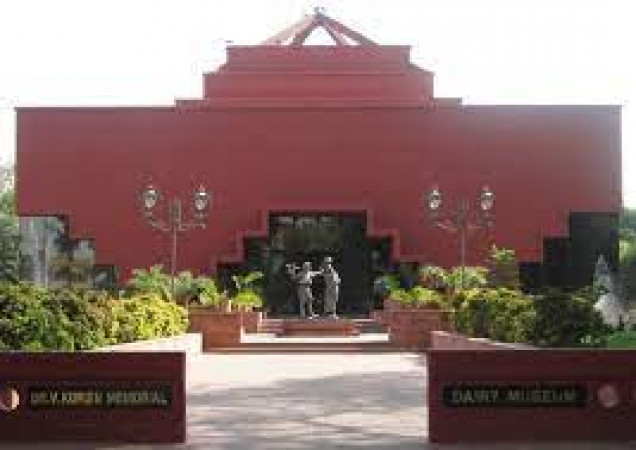Amul Co Operative Museum Travel Guide
Amul Co Operative Museum, located in Anand, Gujarat, is a significant destination showcasing the history and success of the dairy cooperative movement in India. The museum provides insights into the cooperative model, which revolutionized the dairy industry in the country. Gujarat, known as the birthplace of Amul, holds cultural and historical significance in the cooperative sector, making it a must-visit for history and dairy enthusiasts alike.Top Attractions in Amul Co Operative Museum
- Interactive Exhibits on Dairy Industry
- Historical Artefacts Display
- Taste Testing of Amul Products
- Amul Butter Girl Statue
- Documentary Screenings
Amul Co Operative Museum is Famous for
Being the pioneer of the dairy cooperative movement in India, Amul Co Operative Museum is famous for showcasing the success story of the Amul brand and its impact on the dairy industry.Top Attractions in Amul Co Operative Museum
- Interactive Exhibits on Dairy Industry
- Historical Artefacts Display
- Taste Testing of Amul Products
- Amul Butter Girl Statue
- Documentary Screenings
What's Great about Travelling to Amul Co Operative Museum?
- Experience the legacy of the dairy cooperative movement
- Learn about the success story of Amul
- Taste the famous Amul products
What's Not So Great about Travelling to Amul Co Operative Museum?
- Not ideal for travelers uninterested in dairy industry history
- Limited dining options in the vicinity
- May not appeal to young children
Travel Tips for Amul Co Operative Museum
- Visitors must carry valid identification for entry
- Respect photography restrictions inside the museum
- Plan the visit during weekdays for fewer crowds
Important Amul Co Operative Museum trip information
- Ideal Duration: A visit typically takes 2-3 hours.
- Best Time to Visit: The museum is open year-round, but weekdays are less crowded.
- Nearby Airports and Railway Stations: The nearest airport is Vadodara Airport, and the Anand Railway Station is close by.
FAQ's on Amul Co Operative Museum
Q1: What is the best time to visit Amul Co Operative Museum?
The best time to visit Amul Co Operative Museum is during the winter months from November to February when the weather is pleasant and ideal for exploring the outdoor attractions. This period also coincides with various cultural events and festivals, adding to the vibrant atmosphere of the destination.
Q2: Do I need a visa to travel to Amul Co Operative Museum?
Most visitors traveling to Amul Co Operative Museum will need a tourist visa. It is advisable to check the specific visa requirements based on your nationality before planning your trip. Some countries may have visa exemptions or visa-on-arrival facilities for short stays.
Q3: What are the must-visit attractions in Amul Co Operative Museum?
Some of the must-visit attractions in Amul Co Operative Museum include the Amul Dairy Museum, Amul Chocolate Factory, Amul Garden, and the Amul Dairy Plant. These places offer a unique insight into the cooperative movement and dairy industry of the region.
Q4: Is Amul Co Operative Museum a safe place to travel?
Amul Co Operative Museum is generally a safe destination for travelers. However, like any other place, it is advisable to be cautious of your surroundings and belongings, especially in crowded areas. It is recommended to avoid isolated areas at night and follow basic safety precautions.
Q5: What is the local currency in Amul Co Operative Museum and can I use credit cards?
The local currency in Amul Co Operative Museum is the Indian Rupee. Credit cards are widely accepted in hotels, restaurants, and larger stores, but it is advisable to carry cash for smaller establishments and local markets. ATMs are also available in major cities for convenient currency exchange.
Q6: What is the local cuisine like in Amul Co Operative Museum?
The local cuisine in Amul Co Operative Museum is rich and diverse, with a focus on dairy products and traditional Gujarati dishes. Visitors can enjoy delicious snacks like dhokla, fafda, and the famous Amul ice creams. Vegetarian options are predominant, reflecting the cultural preferences of the region.
Q7: What transportation options are available in Amul Co Operative Museum?
Transportation options in Amul Co Operative Museum include public buses, auto-rickshaws, and taxis for getting around the city and nearby attractions. Rental cars and bicycles are also available for those who prefer more flexibility in their travel arrangements.
Q8: Are there any cultural norms or etiquette I should be aware of when visiting Amul Co Operative Museum?
Travelers visiting Amul Co Operative Museum should be respectful of local customs and traditions. It is customary to greet people with a "Namaste" and avoid public displays of affection. Dress modestly when visiting religious sites and always ask for permission before taking photos of individuals. Embracing the local culture will enhance your travel experience in Amul Co Operative Museum.
Q9: I am a travel agent. How can I buy travel leads of Amul Co Operative Museum?
Register yourself as a travel agent at agents.tripclap.com and then you can buy travel leads to Amul Co Operative Museum once your account is approved. For more details contact our support team at +91-8069186564 or support@tripclap.com

